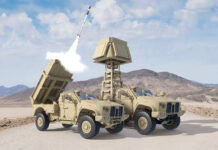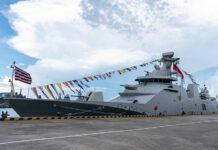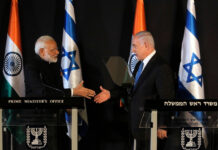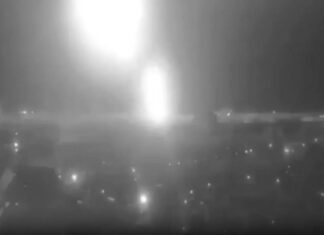The assassination of opposition leader Benazir Bhutto has thrown Pakistan and its 165 million people into one of the worst crises in its 60-year history, raising the specter of widespread civil unrest and the cancellation of elections. Counterterrorism experts warn that the assassination of Benazir Bhutto brings closer the ultimate nightmare of Al-Qaeda and its affiliates being armed with nuclear weapons. In fact, Democrat US Senator Joseph Biden went so far as to claim, that an out-of-control Pakistan would be far more dangerous to the United States than a clerical ruled Iran. The most disturbing element is its nuclear arsenal that makes an unstable high-risk Pakistan the most dangerous country in the world: its stockpile of at least 30 and perhaps as many as 45 nuclear weapons has for years caused sleepless nights in worldwide security establishments.
As for Benazir Bhutto’s untimely demise, Al-Qaeda and those who sympathize with them both in and out of the Pakistan government could well be responsible for her death. But certainly they are not alone in the deadly task. The notorious Pakistani Inter-Service Intelligence (ISI) has many Islamist sympathizers among its senior ranks and getting through the security that surrounded Bhutto, could have been facilitated by the professionals in the highly politicized military establishment. Since 9/11 The United States has lauded Pakistan as a partner in the war against terrorism, particularly against Osama Bin Laden’s Al-Qaeda network. President George W Bush has even praised the Pakistani leader Pervez Musharraf for his hard work in helping to reign in members of the Al-Qaeda group, in an effort to curb their terror activities all over the world.
However, a look inside Pakistan, particularly into their government, would show that they are in leaning more towards militancy and into a radical Islamic society, with a ruling government much like Iran has now. The Islamic party Jamiat-e-Ulema-I-Islami (JUI) along with other smaller Islamic groups has already taken over the majority in the central government of Pakistan. Their views are similar to those of the Ayatollahs and radical Islamists in Iran. Retired General Naseerullah Babar became key person in Pakistan creating the Taliban. The general, a Pashtun was a leader in the fundamentalist JUI party and served as interior minister under Benazir’s late father, Zulfiqar Ali Bhutto, the founder of Pakistan’s nuclear program.
“Often alleged to be an invisible force in Pakistani politics and responsible for countless incidents around the world, ISI is one of the most significant and secretive intelligence agencies existing today. Critics of the ISI say that it has become a state within a state, answerable neither to the leadership of the army, nor to the Prime Minister or even the president himself.”
According to Western intelligence sources, based on inside reports from Pakistan, Thursday’s assassination in Rawalpindi bore the hallmarks of a sophisticated military operation. This report, which varies from others, claims the attack opened, by a suicide bomb which turned out to be a decoy. The explosion followed an ambush by multiple snipers, using sophisticated armor-piercing bullets. They hit, and penetrated the armored limousine, fatally killing Mrs. Bhutto. Whether this version or all the others are accepted, the very fact, that such a deadly attack could have taken place in Rawalpindi, should raise eyebrows throughout intelligence communities. The city is the stronghold of Pakistan’s military establishment and center to its dominant Inter-Service Intelligence (ISI). However, counterterrorist experts have warned, that Al Qaeda or affiliated Islamic Jihadist groups, are known to have effectively penetrated at least one unit of Pakistan’s Special Services Group, if not actually infiltrating into the very sanctum of the powerful ISI itself. In fact, two attempts on President Pervez Musharraf himself were made in Rawalpindi city. One of these was believed the result of a conspiracy involving Al Qaeda and some army officers. The president has already survived several attempts on his life and another; more successful cannot be ruled out, after the brutal murder of his political opponent.
Often alleged to be an invisible force in Pakistani politics and responsible for countless incidents around the world, ISI is one of the most significant and secretive intelligence agencies existing today. Critics of the ISI say that it has become a state within a state, answerable neither to the leadership of the army, nor to the Prime Minister or even the president himself. As result, no effective supervision of the ISI, corruption, narcotics, and big money have all come into play, further complicating the already highly complex political scenario. Drug money was used by ISI to finance not only the Afghanistan war, but also the ongoing proxy war against India in Kashmir and Northeast India. The ISI continued to actively participate in Afghan Civil War, supporting the Taliban in their fight against the Rabbani government. Backing of the Taliban should have ended officially, after the terrorist attacks of September 11, 2001 and US rapprochement; however, there are persisting suspicions that sympathetic elements of the ISI continue to aid Taliban fighters.
Proof that ISI is providing support for Taliban in the southern province of Balochistan was received when NATO forces captured 160 Taliban, many of them Pakistanis, who described in detail the ISI’s support to the Taliban. These mentioned ISI- run training camps near Quetta including huge ammunition dumps, serving as transit points for Taliban’s new weapons and meeting places of the shura, or Taliban leadership council. An especially troubling development deeply concerning NATO fighting in Afghanistan was an ISI sponsored peace pact with Taliban in South Waziristan. This later brought about the Pakistani government signing another deal with the Taliban in North Waziristan, effectively ceding an entire region of Pakistani territory on the Afghanistan border to the Taliban and, therefore, Al-Qaeda, which now virtually gained a safe haven inside Pakistan’s territory.
US Intelligence sources point to former president Zia-ul-Haq loyalists among the retired officers of the Pakistan army and ISI which have long conducted a bitter campaign against Benazir Bhutto. They were determined to see that she did not return to power in the elections scheduled on January 8. Benazir, herself was quoted shortly before her death, that all the Jihadi organizations were opposed to her coming to power, firstly because she was a woman and, secondly, because of her statements, that she would allow US troops to hunt for Osama bin Laden on Pakistani territory and let the International Atomic Energy Agency interrogate the notorious nuclear scientist A Q Khan, the “father of the Islamic Bomb”. As recently as the day before her murder, following a visit to Peshawar, some explosions occurred, over which she expressed concern over her lacking security arrangements, complaining that the electronic jammers, provided by the authorities for protection against remote-controlled explosives, were considered faulty by her security staff.
“Benazir Bhutto’s assassination is an earthquake in Pakistan,” says Dr. Isaac Kfir, an international relations lecturer at the Israeli Interdisciplinary Center in Herzliya and a noted Pakistan expert. Dr Kfir regards the murder as an immense achievement for radical Islam, significantly boosting the power of Islamists in Pakistan under the leadership of Al-Qaeda activists. The Bhutto assassination could prove that radical Islam have already shifted from Afghanistan into Pakistan and is moving from rural areas into the large cities and right into the center of its military establishment. Al Qaeda has openly called for Bhutto’s assassination in the past and has also claimed responsibility for attempts on the life of Pakistan’s powerful president, Pervez Musharraf. Osama bin Laden’s lieutenant and spiritual mentor Ayman al-Zawahiri has challenged both being western puppet, unfit to fit into an Islamic leadership position.
But real concern should be over future repercussions of Benazir Bhutto’s demise, which brings the nightmare of Al-Qaeda and its affiliates being armed with nuclear weapons much closer to reality. The growing unrest in an already highly unstable Pakistan, will present the real danger that Taliban and Al Qaeda will eventually gain control of Pakistan’s nuclear arsenal. If the ongoing infiltration of such subversive and fundamentalist elements continues, then some day in the future, Al Qaeda might well make this doomsday vision fait accompli! Al-Qaeda or its affiliates could well be holding clandestine positions inside the military establishment right now, some of them could even be in control of some nuclear sites already.
“They may not use (those weapons) right away, but that’s the danger,” says former CIA official S. Eugene Poteat, president of the Association of Former Intelligence Officers. “They’ve let it be known publicly what their plans are: their intentions are to kill us.” warns Poteat. On the other hand, Dr Kfir believes that at this point there is no fear of radical regime change in Pakistan. In fact, the assassination could even further boost the army’s power: “President Musharraf would now be able to say that he cannot lead significant changes in the country because he is dealing with terrorism,” Kfir says. “Bhutto’s death will strengthen the army, which will be telling the citizens: This is the reason why we need to stay in power. We are the only ones who can cope with the situation.” But who will guarantee Pervez Musharraf’s own survival? The president has sofar survived miraculously numerous assassination attempts, the last on July 6, 2007, when an unknown group fired an anti-aircraft gun at Musharraf’s plane as it took off from a runway in Rawalpindi. Allegedly, 39 people were arrested, detained and put at an undisclosed location after trying to instigate anarchy in order to seize nuclear weapons.
So what can the United States do in order to safeguard Pakistan’s nuclear arsenal falling into terrorist hands? Whatever critics may say, General Pervez Musharraf is still the principal, if not sole barrier to stop the process of ‘Talibanization’ of his own country. He is the only one with sufficient power to contain an escalating chaos, which might endanger stability. But based on past experiences, his own future is highly unpredictable and if he joins the Bhutto clan fate, being killed by the extremists, who have tried before, anything can happen. If Musharraf is eliminated, it seems doubtful that Pakistan’s military establishment can prevent an eventual takeover by ultra-radical Islamic elements, in an Al Qaeda, or Taliban instigated revolt, creating total chaos in the already unstable and divided nation.
 The fact is that U.S. and NATO policy in Pakistan has run into a dead end. Having put all its eggs in Musharraf’s basket, the U.S. finds itself with no Plan B and no where to turn — except to cultivate a new potential military dictator in the army. The army’s new chief of staff, General Ashfaq Kiyani, 56, may eventually fit this role. As former director of Pakistan’s ISI , the Ft. Leavenworth graduate, the four star general knows all the ropes to become a dominant figure in Pakistan’s political establishment. Whether he becomes powerful enough to replace Pervez Musharraf remains to be seen – if the necessity arises.
The fact is that U.S. and NATO policy in Pakistan has run into a dead end. Having put all its eggs in Musharraf’s basket, the U.S. finds itself with no Plan B and no where to turn — except to cultivate a new potential military dictator in the army. The army’s new chief of staff, General Ashfaq Kiyani, 56, may eventually fit this role. As former director of Pakistan’s ISI , the Ft. Leavenworth graduate, the four star general knows all the ropes to become a dominant figure in Pakistan’s political establishment. Whether he becomes powerful enough to replace Pervez Musharraf remains to be seen – if the necessity arises.
When the CIA learned in 2001 that Pakistani scientists (A Q Khan) had shared nuclear secrets with members of Al Qaeda the alarmed Bush administration responded with tens of millions of dollars worth of equipment, including highly classified specialized intrusion detectors and ID systems to safeguard nuclear weapons. But the Pakistan authorities remained suspicious of U.S. aims and declined to give U.S. experts direct access to the half-dozen or so bunkers, where the components of its arsenal of about 50 nuclear weapons are stored. In fact, even now there is no reliable intelligence about the precise locations of these sites available. The Pakistan military are deeply suspicious, that the secret goal of the United States was to gather intelligence about how to locate and, if necessary, integrate sophisticated technology in their warheads. This could include a secret “kill switch,” enabling the Americans to disable nuclear weapons at will.
Among the proposals was the ‘Permissive Action Links’, or PALS, a technology integrated into nuclear weapons to force any potential user to enter an authorization code before the weapon can be armed. But while many nuclear experts in the federal government favored offering the PALS system because they considered Pakistan’s arsenal among the world’s most vulnerable to terrorist groups, some administration officials feared that sharing this technology with an already unstable Pakistan military establishment, could pose counter productive and even dangerous to US national security. But there are new and more advanced technologies available to safeguard the Pakistan nukes these days. Some of these are kept top secret under all circumstances.
Although precise details are classified, some information indicates that the system hinges on what is essentially a switch inserted into the firing circuit, requiring the would-be user to enter a secret numeric code that starts a timer for the weapon’s arming process and its ultimate detonation. While most switches already disable themselves if the sequence of numbers entered turns out to be incorrect, a newly installed link sets off a small explosion in the warhead rendering it unserviceable. The very design of this sophisticated system is what worries the Pakistanis most: if US special agents will bury the link deep inside the weapon system, this would, in fact enable Washington full round-the-clock supervision of Pakistan’s nuclear network.
But matters are far from simple. “We cannot say with absolute certainty that we know where the Pakistani weapons all are located,” said a former U.S. intelligence official who closely tracked the security upgrades. Therefore, experts warn that any attempt by the United States to seize the weapons to prevent their loss, “could become extremely messy“.
Nevertheless, as long as the Musharraf administration is in control, US intelligence officials believe that Pakistan’s nuclear stockpile is relatively safe. But they worry that its security could be weakened if the current turmoil persists or even escalates further into totally uncontrolled chaos. US military officials are particularly concerned by early signs of fragmented loyalties among senior Pakistan’s military and intelligence leaders, who currently share responsibility for protecting the arsenal.
Reports circulating in Washington mention that early 2008, US Special Forces are expected to vastly expand their presence in Pakistan, as part of an effort to train and support indigenous counter-insurgency forces and clandestine counter-terrorism units in an effort to guard the sensitive nuclear sites. It may be, as usual as happens in this volatile region, too little and too late. Moreover, if the US military is planning to seize the nuclear weapons sites in an emergency, their fate could be much worse than in Operation “Eagle Claw”, the abortive Iran rescue mission in April 1980, which ended in total disaster.
One matter is crystal clear: Al Qaeda’s quest in gaining access to, at least some of Pakistan’s “Islamic nuclear” arsenal, under these stringent circumstances must be taken very seriously. A thought that a stateless terrorist organization will possess nuclear weapons can become the ultimate nightmare to all free nations. Only determined and wise statesmanship can avert such a doomsday prophesy before it materializes. But is there such a leadership in sight during 2008?
















